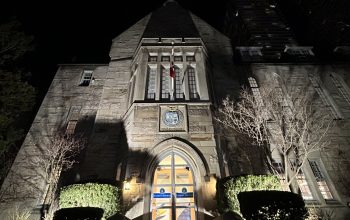Post-secondary schools must create a new free speech policy or face funding cuts
Chiara Greco ASSOCIATE NEWS EDITOR
Photo: Students protest white nationalist Faith Goldy at Wilfred Laurier University. Hannah Yoon / THE CANADIAN PRESS
With a new year approaching, the University of Toronto (U of T), as well as other Ontario colleges and universities, faces the task of implementing and mandating a new freedom of speech policy in accordance with the Ontario government.
During the 2018 spring election, Doug Ford made a statement that Ontario colleges and universities must develop a new free speech policy or face funding cuts. These new policies must be laid out and implemented by January 1, 2019.
It is now U of T’s responsibility to develop and implement the new free speech policy, one which will differ from its previous free speech statement curated 26 years ago. The new government prescribed policy will, according to Global News, “adhere to principles based on the University of Chicago Statement on Principles of Free Expression.”
So, what exactly is changing in regards to U of T’s policy? Well, students can expect a change in the definition of free speech. As of right now, The University’s Statement on Freedom of Speech maintains that the university may limit the right to free speech in accordance with the Criminal Code of Canada.
The University of Chicago standard differs slightly from the current U of T statement. According to a CBC article, “[University of Chicago standard] precludes shielding students from ideas they might disagree with or find offensive.” Ford has warned institutions that funding cuts will be initiated if they fail to adopt these policies.
According to the Globe and Mail, the University of Chicago standard also “defend[s] controversial speakers on campus.” This standard will become the main blueprint for all Ontario universities.
This standard will still leave a gray area in what is considered a violation of free speech. After all, respectful debate is essential to university life, and to limit debate could constitute a limit to the exercise of free speech. It therefore seems that the current conception of what free speech is at U of T will be under scrutiny. With major debate and argument surrounding free speech at universities, the government is turning to these new policies in hopes of initiating a change.
Concerns with this new policy include speculation that the government’s standard could potentially blur the lines between free speech and hateful speech. This concern may be the main reason as to why it is so important to outline what does or does not constitute free speech practice. Defining what free speech is helps to control potentially threatening, unsafe spaces, which many Ontario universities have been at the forefront of.
The main concern following in accordance is that of safety. How will this new mandated policy affect principles that some believe to be at odds with free speech — like that of equity, diversity, inclusion? It is still maintained, as U of T’s President points out in an article by The Varsity, that the right to freedom of speech is enabled by “an environment that values respect, diversity, and inclusion.” This will not change with this new policy. However, the safety of marginalized groups must be considered, as well as protection against hateful speech and its difference to legal hate speech.
Reactions to this policy come from a Facebook post by the Arts & Science Student Union (ASSU), stating that they hope the “administration upholds the principles that are present within [the current] Statement of Equity, Diversity, and Excellence and will not fall to the whims of those who seek to use freedom of speech as a vehicle to harm marginalized students on campus.”
If it does occur that a student chooses to contravene the policies, they would be subjected to the existing campus discipline measures U of T has in place. As far as non-compliance by student unions, institutions are being directed to withhold their funds. As with anything, though, there is controversy regarding many of the decisions around the implementation of this new policy. Most of this controversy is surrounding the blurred lines it may incite between hateful speech, legal hate speech, and free speech.
If it is the case that the government is issuing a veiled threat to universities, colleges, and student unions, then what is the motive behind this? Students will have to wait for the new year to truly see the change these policies will establish in everyday practice at U of T.



